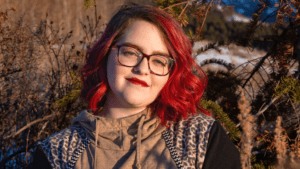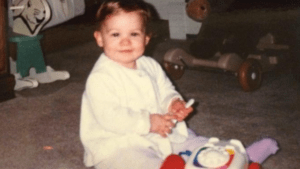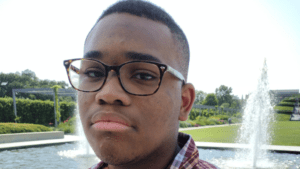This guest post is by a young man who is diagnosed with autism and plans to attend SUNY Old Westbury. He is applying for the Spring 2024 Making a Difference Autism Scholarship via the nonprofit KFM Making a Difference started by me, Kerry Magro. I was nonverbal till 2.5 and diagnosed with autism at 4, and you can read more about my organization here. Autistics on Autism: Stories You Need to Hear About What Helped Them While Growing Up and Pursuing Their Dreams, our nonprofit’s new book, was released on March 29, 2022, on Amazon here for our community to enjoy featuring the stories of 100 autistic adults.
At 18 months, I was officially diagnosed with Autism, starting a long and unpredictable journey of life on the spectrum. At 18 months I had the skills of a 6-month-old. Going from a childhood diagnosis of a potentially speechless life to eventually becoming valedictorian did not come without overcoming a plethora of obstacles. I struggled to adapt to different types of classroom settings. I would eventually have to deal with being harassed and targeted. On top of all of this, my dad was not interested in or encouraging about my diagnosis or education. He has never been interested in my life, let alone my education, and did not come to my high school graduation.
But this would not be the way my story would end up. My mom and I would not allow my story to be one of bad news and struggles. My mom recognized the challenges I was dealing with early on and developed a philosophy of fighting for as many services as possible within the least restrictive settings. This was complicated as my needs were unique, nuanced, and changed greatly throughout my life. She understood that children on the spectrum need stability and structure and often had to spend a great deal of time and effort fighting to make sure I had the services I needed.
I began receiving multiple types of therapy from as early as the age of two including: ABA (Applied Behavioral Analysis), Occupational Therapy, Speech Therapy, and Psychical Therapy. At one point I was working with 10 different therapists. I had fine motor issues, sensory processing issues as well as difficulties with focus, attention, distractibility, and organization. I toe walked, w-sat, and had speech delays. Throughout each stage of school my IEP (Individualized Education Plan) has changed to help accommodate these challenges. My sensory issues were so severe that I went to a sensory gym to desensitize. Throughout elementary school, I received speech, physical, and occupational therapy. For physical and occupational therapy, I received “Push-In” therapy, which would take place within the classroom. Therapists helped to guide me through impulses and distractibility with hands-on and real-time redirection. I was also in multiple programs for students on the spectrum including TOTS (These are Our Treasures) from ages 2-5 and Nest from kindergarten to the 6th grade, which helped develop students in a reduced class size, with an integrated co-teaching model.
The services made a huge difference, but I still faced so many other challenges inside and outside of school. I was assaulted by a classmate in the 3rd grade and had to transfer to a public school in Queens for 4th grade. My family eventually had a falling out, which devastated me. In high school, I had to deal with betrayal, defamation, and harassment by someone I had considered a friend. Fighting through all of this and attaining the position that I am in today required me to comprehensively understand the challenges that I was facing, boldly confront those challenges, and advocate for the support necessary for me to continue to succeed.
For seven years I was enrolled in the Nest program. It accepts and places several high-functioning students in a general education classroom environment, while pulling them out for a social group several times a week. The program was not only extremely difficult to get into but leaving would make re-entry impossible. By middle and junior high school, I began to grow out of certain services and my IEP was updated accordingly. I continued receiving testing and assignment accommodations as well as occupational therapy. However, I was no longer receiving speech or physical therapy. During the sixth grade, I had a major epiphany about the Nest program, myself, and my social skills. I felt that the program was not allowing me to reach my full social potential. I realized I could have more success socially outside of this program and needed to leave. Leaving the program was a significant step forward in my journey, both academically and socially. This took massive amounts of courage and determination. After making my decision and following through, my social skills have improved immensely. Improving my social skills has opened doors to opportunities that would not have been possible otherwise. The courage and confidence I was able to build since leaving Nest and normalizing my social life have supported and encouraged my growth – not just as a friend and student, but as a performer.
I have always loved musical theatre and was exposed to performing from a young age. After leaving the Nest, I went on to perform in many shows, including an off-Broadway production. I sang in a choir that performed for a George Floyd Benefit concert. I was in a commercial with an international tennis superstar. I attended a performing arts high school, where the curriculum included dance, vocal, and acting classes. I even had the opportunity to produce an original play that I wrote and adapted from a research paper in my English class. Throughout high school, I simultaneously juggled schoolwork performing in plays inside and outside of school, as well as tap dancing. As a performer, I really came out of my shell. Being able to take on the role of someone else and entertain an audience is something that is truly special to me. I would even say that the world of theatre has helped me to overcome social struggles and become a more outgoing and extroverted person. Performing has helped me to express myself more effectively and make many friends.
Follow my journey on Facebook, my Facebook Fan Page, Tiktok, Youtube & Instagram.
My name is Kerry Magro, a professional speaker and best-selling author who is also on the autism spectrum. I started the nonprofit KFM Making a Difference in 2011 to help students with autism receive scholarship aid to pursue post-secondary education. Help support me so I can continue to help students with autism go to college by making a tax-deductible donation to our nonprofit here.
Autistics on Autism: Stories You Need to Hear About What Helped Them While Growing Up and Pursuing Their Dreams was released on March 29, 2022 on Amazon here for our community to enjoy featuring the stories of 100 autistic adults. 100% of the proceeds from this book will go back to our nonprofit to support initiatives like our autism scholarship program. In addition, this autistic adult’s essay you just read will be featured in a future volume of this book as we plan on making this into a series of books on autistic adults.














